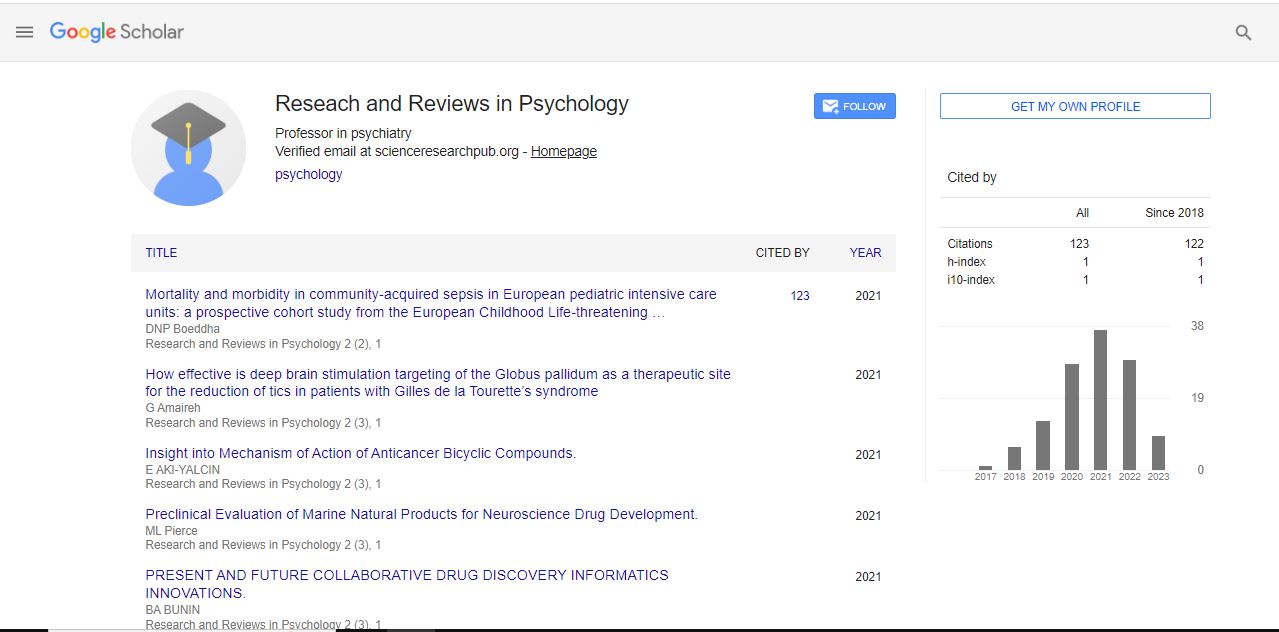Perspective, Res Rev Phys Vol: 4 Issue: 4
Neuropsychology and Education: Applying Brain Science to Enhance Learning
Gloe Moser*
1Department of Psychology, Michigan State University, East Lansing, USA
*Corresponding Author: Gloe Moser,
Department of Psychology, Michigan State
University, East Lansing, USA
E-mail: moster.gloe@msu.edu
Received date: 28 November, 2023, Manuscript No. RRPY-23-124312;
Editor assigned date: 30 November, 2023, Pre QC No. RRPY-23-124312 (PQ);
Reviewed date: 15 December, 2023, QC No. RRPY-23-124312;
Revised date: 22 December, 2023, Manuscript No. RRPY-23-124312 (R);
Published date: 29 December, 2023, DOI: 10.4192/rrpy.1000355
Citation: Moser E (2023) Neuropsychology and Education: Applying Brain Science to Enhance Learning. Res Rev Phys 4:4.
Description
The intersection of neuropsychology and education represents a powerful synergy between the study of the brain and the science of learning. This dynamic relationship seeks to apply insights from neuroscientific research to enhance educational practices, creating an environment that aligns with the cognitive processes of the brain. The present findings delves into the collaborative efforts between these fields, exploring how an understanding of neural mechanisms can inform educational strategies to optimize the learning experience.
Neuroplasticity, the brain's ability to reorganize itself in response to experiences, underscores the malleability of the brain. Educators can leverage neuroplasticity by providing enriched learning environments, varied instructional methods, and opportunities for active engagement, promoting optimal brain adaptation. Neuropsychology challenges the notion of a one-size-fits-all approach to learning. Acknowledging diverse learning styles, educators can tailor instruction to accommodate visual, auditory, and kinesthetic learners, recognizing the variability in how individual brains process information. Executive functions, including cognitive processes like planning, organization, and selfregulation, play a pivotal role in academic success. Neuropsychological insights guide educators in fostering the development of executive functions, providing strategies to enhance students' ability to manage tasks and solve problems.
Metacognition, the awareness and regulation of one's own thought processes, is central to effective learning. Educators can encourage metacognitive practices, such as goal-setting and reflection, empowering students to take an active role in their learning journey. Neuropsychology supports the idea of multisensory learning, recognizing the brain's capacity to process information through multiple sensory modalities. Incorporating visual aids, auditory elements, and hands-on activities enhances the engagement and retention of information. Classroom design can impact the learning environment. Applying principles from neuropsychology, educators can create spaces that minimize distractions, optimize lighting, and foster a positive emotional climate, promoting an atmosphere conducive to learning.
Cognitive load theory, grounded in cognitive psychology and neuropsychology, explores the cognitive demands imposed on learners. Educators can use this theory to design lessons that manage cognitive load effectively, ensuring that instructional materials align with the brain's processing capacities. Neuropsychology informs the integration of digital tools in education. Understanding the technology impacts cognitive processes allows educators to select and design digital resources that enhance learning without overwhelming the brain's cognitive resources. Emotional intelligence, the ability to recognize and manage emotions, is intertwined with learning. Neuropsychological insights guide educators in fostering emotional intelligence, creating a supportive and emotionally safe environment that enhances students' well-being and readiness to learn. Chronic stress can negatively impact learning by affecting cortisol levels in the brain. Neuropsychology suggests stress-reducing strategies, such as mindfulness and relaxation techniques, to mitigate the adverse effects of stress on cognitive functioning.
Embracing a neurodiversity perspective acknowledges the variability in neurological functioning among individuals. Educators, informed by neuropsychological principles, can adopt inclusive practices that celebrate and accommodate diverse learning profiles, recognizing the strengths of neuro divergent students. Neuropsychology supports the development of personalized learning plans that address the specific needs and strengths of individual students. Tailoring instruction to students' cognitive profiles enhances their engagement and success in the learning process. Neuropsychological assessments can provide valuable information about students' cognitive strengths and challenges. This data informs the development of targeted interventions, allowing educators to address specific cognitive domains and optimize learning outcomes.
Longitudinal studies that track the cognitive and academic progress of students over time contribute to the refinement of educational interventions. By aligning neuroscience-informed strategies with empirical data, educators can continually improve their instructional practices. Ethical considerations in neuro education include obtaining informed consent from students and parents when implementing interventions that involve neuropsychological assessments or neuroscientific techniques. Respect for individuals' autonomy ensures ethical and responsible practices.
"Neuropsychology and Education Applying Brain Science to Enhance Learning" embodies the collaborative journey between neuroscience and education, seeking to optimize the learning experience for every student. From understanding cognitive processes to implementing neuroscience-informed strategies, this integration holds the potential to revolutionize educational practices. The educators pave the way for an inclusive, dynamic, and effective learning environment. As this interdisciplinary collaboration continues to evolve, it promises to shape the future of education, fostering a generation of learners who are not only academically proficient but also equipped with a deep understanding of their own cognitive processes and the tools to navigate a complex, ever-changing world.
 Spanish
Spanish  Chinese
Chinese  Russian
Russian  German
German  French
French  Japanese
Japanese  Portuguese
Portuguese  Hindi
Hindi 